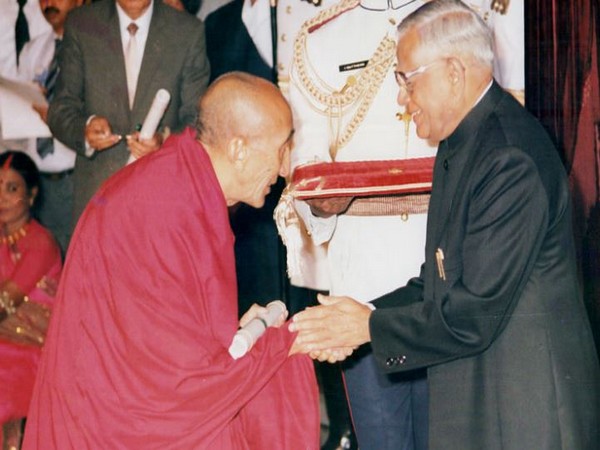Kushok Bakula Rinpoche and his contribution to revival of Buddhism in Mongolia
The 19th Bakula Rinpoche, Ngawang Lobzang Tubstan Choknor was recognised by the thirteenth Dalai Lama as the reincarnation of Bakula Arhat (one of the 16 Arhats who were the direct disciples of the Shakyamuni Buddha).

- Country:
- Mongolia
The 19th Bakula Rinpoche, Ngawang Lobzang Tubstan Choknor was recognised by the thirteenth Dalai Lama as the reincarnation of Bakula Arhat (one of the 16 Arhats who were the direct disciples of the Shakyamuni Buddha). The 19th Bakula Rinpoche was born into the royal Buddhist family of Matho village in Ladakh on 19 May 1917. Being born to the royal family, he was popularly known among his people as rGyalsras Bakula. 'rGyal' in Tibetan means 'King' and 'Sras' is an honourable designation for 'son'.
Bakula Rinpoche went to Tibet for his monastic education and completed the Geshe Lharampa degree (equivalent to Ph. D) in 1940 from Drepung Monastery in Tibet. Soon after completing his Gehse degree, Kushok Bakula, on the request of his disciples from Spituk and Sankar monasteries came back to his native land Ladakh in 1940. His return from Tibet coincided with the time when the people of Ladakh were striving under the atrocities of their own officials and were in need of someone who could virtually guide them in shaping their identity. Thus, his knowledge and values of Buddhist fundamental principles of love and compassion made him dedicate his life selflessly for the betterment of the situation and life of his fellow Ladakhis.
Rinpoche not only guided his people on the religious path but also successfully took the responsibility of a political leader as well. He was a person of simple living and high thinking that separated him from other leaders. His role in the social, educational, economic and political uplift of Ladakh is noteworthy and he is rightly called the 'Architect of Modern Ladakh'. Kushok Bakula was a legendary figure, his welfare activities were not confined up to Ladakh only but stretched to countries outside India like Mongolia and Russia.
During his lifetime, Bakula Rinpoche served in many official positions including being a minister in Jammu and Kashmir Government, two-term Member of Parliament (Lok Sabha), a Member of the National Commission on Minorities in 1978 and India's Ambassador to Mongolia for a decade from 1990 to 2000. History records that prior to his Ambassador position, Rinpoche visited USSR in 1968 on the invitation of Lama Gonpo Jampel Dorje (also known as Khambo Lama Zhambaldorj Gomboyev) who then served as the Supreme Head of Buddhist in USSR.
This was his first visit to USSR where on the request of the local people Rinpoche was engaged in giving teachings, empowerments and oral transmission. He also met and discussed subject related to Buddhism with many govt. officials and heads of the Buddhist clergy of the USSR and Mongolia. Consequently, this led to the successful foundation of Asian Buddhist Conference for Peace (ABCP) in Ulaanbaatar in 1969. Thus, throughout his life he would continue to support the revitalization of Buddhism in the USSR. As he took the position of Ambassador to Mongolia in January 1990, Rinpoche without wasting a single day started working on the restoration of Buddhism in Mongolia. He did a remarkable job in strengthening the bilateral relation between the two countries by reviving and restructuring Buddhism in Mongolia. One of the most crucial things that Bakula Rinpoche noticed during his travel was the condition of the Buddhist Monasteries. There was no place where a monk could go to get proper training and adequate education.
Rinpoche quite often pointed out the importance of upholding one's monastic vows therefore he set out to establish the Pethub Monastery in Ulaanbaatar which is named after his own monastery in Ladakh. Besides, he also recognised the spiritual needs of women, thus opened the Lay Women Buddhist Organization and gave monastic ordination to women, the first-ever in modern Mongolia. On the initiative of Bakula Rinpoche the first public celebration of the Buddha Purnima in the democratic Mongolia was held on 29 May 1991 at the National Cultural and Recreational Centre. Also, it was at the request and initiative of Bakula Rinpoche that in August 1993 the Govt. of India brought the Buddha Relics kept at National Museum, New Delhi to Ulaanbaatar for public exposition.
Hence, Bakula Rinpoche's remarkable activities in the revival of Buddha Dharma rightly proved the legendary prophesy made by well-known Mongolian monastic scholar Zava Damdin Kachu (1867-1937). He predicted that "Buddhism in Mongolia will be assaulted by inimical forces. He further predicted that sometime after the destruction of Buddhism in the country, Arhat Bakula will come to Mongolia to revitalize the Mongolian Buddhist tradition and will restore the Mongolian Buddhist cultural heritage to its previous glory."
After resigning from his political position Rinpoche, despite his advanced age continued his travels where he felt his teachings were required and people's religious needs were suppressed. The president of Mongolia for his great service to their nation conferred Kushok Bakula with the 'Polar Star' award, the highest award of Mongolia. Even today, the people of Mongolia have immense admiration and faith in him and still hold the affectionate title of "Ambassador Teacher" (Elchiin Bagsh). Hence, Kushok Bakula is rightly called as a statesman, a revolutionist, a visionary and a saint who made an outstanding contribution and devoted his entire life to the service of his people and country till the last breath in 2003. (ANI)
(This story has not been edited by Devdiscourse staff and is auto-generated from a syndicated feed.)
ALSO READ
Call for Accountability in Jammu & Kashmir
Omar Abdullah's Inclusive Approach to Jammu & Kashmir's Budget
Jammu's Religious Tourism: A Boost to the Region's Economy
Delhi polls: AAP chief Arvind Kejriwal loses to BJP's Parvesh Verma by 4,089 votes from New Delhi seat, says EC.
Tight Race in New Delhi: AAP vs BJP










